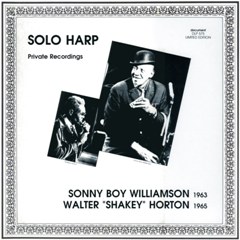Sonny Boy Williamson & Big Walter Horton - Solo Harp (1989)
Sonny Boy Williamson & Big Walter Horton - Solo Harp (1989)

01. I'm Down and Thinking (S.B. Williamson)
02. Trust My Baby (S.B. Williamson)
03. Bye Bye Bird (S.B. Williamson) play
04. Blues Of The Blues (S.B. Williamson)
05. Work With Me (S.B. Williamson)
06. The Loneliest Man (S.B. Williamson)
07. Blues (On Chromatic Harp!) (B.W. Horton)
08. Shakey's Boogie (B.W. Horton) play
09. Things Ain't What They Used To Be (B.W. Horton)
10. Baby I Need Your Love (B.W. Horton)
11. Medley (B.W. Horton)
.... (I Lost My Baby - St Louis Blues - Careless Love - John Henry)
Sonny Boy Williamson (Rice Miller) - Solo Harmonica & Vocals
Recorded live at a private party in Baden-Baden,
Germany, 27 September 1963.
Big Walter 'Shakey' Horton - Solo Harmonica & Vocals
Recorded live at a private party in Dortmund,
Germany, 25 September 1965.
Sonny Boy Williamson was, in many ways, the ultimate blues legend. By the time of his death in 1965, he had been around long enough to have played with Robert Johnson at the start of his career and Eric Clapton, Jimmy Page and Robbie Robertson at the end of it. In between, he drank a lot of whiskey, hoboed around the country, had a successful radio show for 15 years, toured Europe to great acclaim and simply wrote, played and sang some of the greatest blues ever etched into black phonograph records. His delivery was sly, evil and world-weary, while his harp-playing was full of short, rhythmic bursts one minute and powerful, impassioned blowing the next. His songs were chock-full of mordant wit, with largely autobiographical lyrics that hold up to the scrutiny of the printed page. Though he took his namesake from another well-known harmonica player, no one really sounded like him.
A moody, bitter, and suspicious man, no one wove such a confusing web of misinformation as Sonny Boy Williamson II. Even his birth date (stated as December 5, 1899 in most reference books, but some sources claim his birth may have been in either 1897 or 1909) and real name (Aleck or Alex or Willie "Rice" -- which may or may not be a nickname -- Miller or Ford) cannot be verified with absolute certainty. Of his childhood days in Mississippi, absolutely nothing is known. What is known is that by the mid-'30s, he was traveling the Delta working under the alias of Little Boy Blue. With blues legends like Robert Johnson, Robert Nighthawk, Robert Jr. Lockwood, and Elmore James as interchangeable playing partners, he worked the juke joints, fish fries, country suppers and ballgames of the era. By the early '40s, he was the star of KFFA's King Biscuit Time, the first live blues radio show to hit the American airwaves. As one of the major ruses to occur in blues history, his sponsor -- the Interstate Grocery Company -- felt they could push more sacks of their King Biscuit Flour with Miller posing as Chicago harmonica star John Lee "Sonny Boy" Williamson. In today's everybody-knows-everything video age, it's hard to think that such an idea would work, much less prosper. After all, the real Sonny Boy was a national recording star, and Miller's vocal and harmonica style was in no way derivative of him. But Williamson had no desire to tour in the South, so prosper it did, and when John Lee was murdered in Chicago, Miller became -- in his own words -- "the original Sonny Boy." Among his fellow musicians, he was usually still referred to as Rice Miller, but to the rest of the world he did, indeed, become the Sonny Boy Williamson.
Big Walter Horton was a virtuoso blues harmonica player who, ironically, never achieved the fame of the renowned harpists he taught and inspired—including James Cotton, Little Walter Jacobs, and Rice Miller. Horton is remembered as a gentle man who never quite escaped poverty and poor health he was born into. Bruce Iglauer, who produced the 1972 record Big Walter Horton with Carey Bell, called him one of "only four great creative geniuses of modern blues harmonica," ranking him alongside Jacob, Miller, and John Lee ‘Sonny Boy’ Williamson. Those three harp players were "recognized, honored and extensively recorded with their own bands," Iglauer wrote, but Horton remained relatively obscure at his death in 1981. "Perhaps… this shy, withdrawn man (was) never aggressive enough to hustle a contract with a major record label. Or perhaps… his harmonica is so subtle, so delicate, that it requires hard, concentrated listening to appreciate."
Horton crafted "a unique, fluid style that fused blues feeling with an uplifting jazzlike tone," wrote Chris Smith. "The beauty that he created through his music was in striking contrast to the troubled life he lived. Walter Horton was a shy, sensitive man who had to deal with poverty and illness most of his life. Often uncommunicative in conversation, he ‘spoke’ through his instrument, creating a world of lyric beauty, wit and energy." Writer Charles Shaar Murray offered a similar assessment in The Blues on CD, "Despite the greater fame and popularity of Little Walter, James Cotton, Junior Wells, and Paul Butterfield, many connoisseurs regard Horton as the finest of all the great post-war harp men."
download: uploaded anonfiles mega 4shared mixturecloud yandex mediafire ziddu
Last Updated (Monday, 01 July 2013 20:42)








